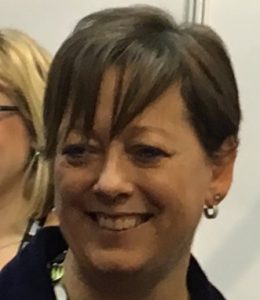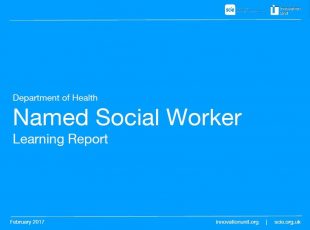Pilot expansion and extra funding strengthens the voice of people with learning disabilities, autism and mental health conditions
Delegates attending the National Children and Adults Services Conference (NCAS) in Bournemouth last week might have heard our Minister for Care and Mental Health Jackie Doyle-Price announce the release of £400,000 additional DH funding for phase two of the Named Social Worker pilots. This is very good news.

Funding aside, what pleases me most about this expansion of the pilot is that even more people with learning disabilities, autism and mental health conditions will be given one primary point of contact for their care and support needs. This will mean consistent and constant advice, service coordination with family and carers, and proactive contact with community networks to help people live as independently as possible.
My ambition for the programme – as it is for everyone we seek to help - is for people with learning disabilities and other cognitive conditions to live a good life. The pilots offer the opportunity for social workers to provide excellent person-centred support for individuals and the people around them.
The programme equips and supports social workers to be enablers of high quality, responsive, person centred and asset based care. This in turn encourages the building of more effective, efficient and integrated systems, bringing together health, care and community support. This is a fantastic opportunity to make simple changes with huge, lasting impact.
My priority for this second phase is to really develop 'good social work' and be ambitious about what this could mean. For our practice, it’s a golden opportunity to really understand and reflect on the effectiveness of our work through evidence and results.
We should be able to see the real impact named social workers have on people’s lives. Placing individuals with particular support needs at the heart of the pilot – involving them in design and delivery, learning and evaluation - helps us shape effective social work practice in the round.
 As part of the phase two launch I was pleased to join the inaugural webinar earlier this month, hosted by the Innovation Unit. Participants were able to share in the collective enthusiasm for the project and the desire to make a difference.
As part of the phase two launch I was pleased to join the inaugural webinar earlier this month, hosted by the Innovation Unit. Participants were able to share in the collective enthusiasm for the project and the desire to make a difference.
Meanwhile, colleagues from the Innovation Unit and the Social Care Institute for Excellence (SCIE) are working together to distil and share the learning from original pilot areas. Register or log in to SCIE’s website to read their previous Learning Report.
 Through the webinar, I also heard some great examples of named social workers in phase one sites constructively challenging health professionals – helping to deliver positive outcomes for those in their care. They were also really keen to understand as much as possible about what worked in phase one – and also what didn’t work.
Through the webinar, I also heard some great examples of named social workers in phase one sites constructively challenging health professionals – helping to deliver positive outcomes for those in their care. They were also really keen to understand as much as possible about what worked in phase one – and also what didn’t work.
I have no doubt these six areas will do a great job and if phase one was anything to go by then the wider sector stands to gain hugely from the pilot’s expansion. Good luck to all the participating sites – I can’t wait to hear how they get on!
2 comments
Comment by Eileen McIvor posted on
Whilst appreciating all that is being done by Social workers in the different fields of caring, why is it necessary to use such complicated language to write of specific types of work being done.
I find the sentence "named Social Workers constructively challenging Health Proffesssionals" to be particularly rude and offensive. Surely an " amicable discussion" would be less dictatorial, and more in keeping with both Proffesssionals being knowledgeable in their own field of work.
The real concerns and the need of kindness seems to me, to have got lost. Way back in the years I was doing my job, love of my fellow man/woman was a major part of the caring, both for the Carer and the person needing the care.
Comment by Lyn Romeo posted on
Hello Eileen. Thank you for your comment. Our main objective as social workers is to provide compassion, consistency and care for people and their families. It is helpful though to remind us all to keep language straightforward and easily understood, so thank you! The 'challenge' in this instance was meant in an entirely respectful and professional way - a way of making sure all of us involved in supporting people keep their needs, concerns and hopes at the heart of their care and support. Best wishes, Lyn.